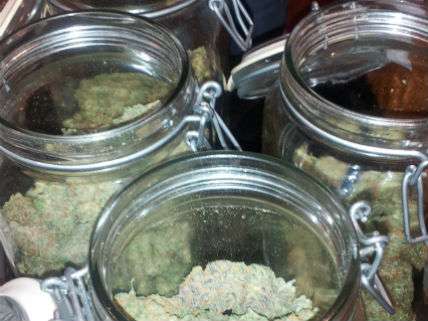Leading Legalization Opponent to Sell Medicine That Competes Directly With Marijuana
Insys, which plans to introduce an oral THC spray, says legal pot could "significantly limit" its commercial prospects.

Insys Therapeutics, the Arizona-based pharmaceutical company that recently became the biggest financial supporter of the campaign against marijuana legalization in that state, makes an oral fentanyl spray that might compete with cannabis as a painkiller. But as Lee Fang notes at The Intercept, Insys has another, more direct financial interest in defeating marijuana legalization: It is about to introduce an oral spray to deliver dronabinol, a synthetic version of THC, marijuana's main active ingredient, as a treatment for AIDS wasting syndrome and the nausea and vomiting caused by cancer chemotherapy.
In a 2007 disclosure statement that Insys filed with the Securities and Exchange Commission, the company noted the competitive threat posed by marijuana legalization:
Legalization of marijuana or non-synthetic cannabinoids in the United States could significantly limit the commercial success of any dronabinol product candidate.…If marijuana or non-synthetic cannabinoids were legalized in the United States, the market for dronabinol product sales would likely be significantly reduced and our ability to generate revenue and our business prospects would be materially adversely affected.
The Food and Drug Administration (FDA) approved Marinol, a dronabinol capsule, in 1985 for the same two indications cited by Insys. The company's oral spray, which the FDA approved in July, should take effect faster than Marinol and be easier for patients suffering from severe nausea to absorb. But smoked or vaporized marijuana has those same advantages and will no doubt be considerably less expensive than the product Insys plans to sell, especially in a full-scale legal market like the one voters could decide to authorize this fall in Arizona, where marijuana is already legal for medical use.
Insys says it gave $500,000 to Arizonans for Responsible Drug Policy, the main group opposing Arizona's legalization initiative, because the measure "fails to protect the safety of Arizona's citizens, and particularly its children."
